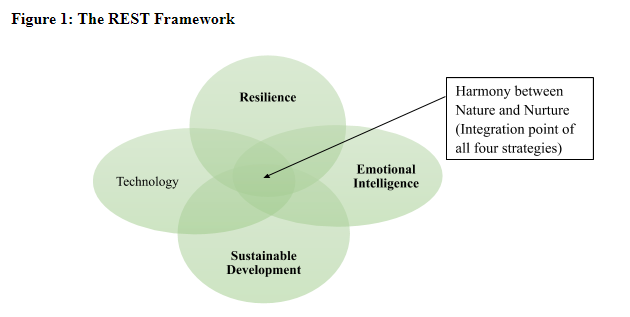‘REST’: A framework to realign strategies amidst COVID-19 pandemic

Months before when I was driving back home from my workplace, I had no idea that I would be working from home because of a deadly virus outbreak. I had no idea that the world would go upside down in order to fight the pandemic. I had no idea that the things which were ‘normal’ and taken for granted- a cup of coffee with friends, the daily commute to office, a flight home- would become luxury. Anxiety, infections and deaths across the world due to Coronavirus outbreak have put us in great grief. In addition to the immediate concern about the real impact on human lives, there is fear about the severe economic downturn that may result from a prolonged battle with the novel coronavirus. Businesses are being shuttered around the world and people are losing their jobs. Coronavirus Pandemic is not only a health crisis but also a global economic calling. Businesses around the world need to realign their strategies in order to overcome the people and economic threat the deadly virus has posed before them. Amidst global lockdowns it is high time to think of a framework which can help to revise and revisit organizational strategies in order to face the challenges in the changing work environment. It has become clear that our era would be defined by a fundamental chasm: the period before the coronavirus pandemic and the period after that. organizations need dramatic restructuring in order to navigate this crisis. For this it would be important to establish behaviours where that can help organizations operate to their optimum capacity and help people earn a living. Decisive actions from organizations across the globe is warranted (Kumar 2020), to ramp up the existing systems to tackle the period post coronavirus pandemic.
This article is an attempt to put forth a framework -REST- in order to realign strategies and restructure organizations in order to establish behaviours which better resonate with nature. The REST framework (Figure 1), comprises of four strategies: Resilience, Emotional Intelligence (EI), Sustainable Development and Technology. Integration of all these four strategies can lead the world into a better position to establish harmony between nature and nurture.
Figure 1: The REST Framework

Resilience
This pandemic has emerged as the greatest challenge since the world war II and has claimed 11,24,625 lives as on 21st October, 2020 (BBC News 2020). The necessity to protect public health and a sudden pullback in economic activities, have simultaneously caused abruption to the well-being of individuals and the economies across the world. In the face of these challenges, resilience is a vital necessity. We have seen some effective management across sectors in order to keep things moving, like: upgrading to digital payments, management of liquidity and stocks, continuation of necessary services (such as: banks, sanitation, health etc.), and work from home. But such things need to be managed more strategically to provide long-term solutions. “Work from home”, became another normal. People across sectors have been working from home to keep the necessary things moving. We need to embrace this change and experiment with this ‘new normal’. Organizations may think of establishing clear remote-work policies and training in advance, to prepare themselves in times the rapidly changing circumstances (Larson et al 2020). To develop resilience in stakeholders, education, awareness and community participation should be encouraged. Collecting, analysing and disseminating information related to critical incidents and emergencies can help in better preparedness for any unforeseen situations.1
Emotional Intelligence
In these tough times, the world has seen a lot of examples where people displayed immense emotional intelligence (EI). From distributing food packets to the needy to offering selfless services to the infected; from contributing money for safeguarding the interests of poor people to thanking those on fields by cheering for them. There are many examples across the globe but it’s time to be emotionally intelligent for ever. EI has been regarded as higher order skill to achieve life goals (Goleman 1995), and becomes even more important for managing a crisis. Empathy, motivation, self-awareness and regulation and social skills, have been regarded as basic tenets of EI (Goleman 1995). While, it helps us understand and manage our panic and reactions, it also helps us understand others’ emotional state and help them keep their calm. Because people understand and see situations with mindfulness, making strategies and communicating them become less complicated in the times of crisis. Thankfully, there are many incidents of organizations displaying EI than otherwise. Organizations displayed EI when they asked their employees to stay safe in their homes and telecommute. Facebook, Google, Microsoft, and IBM cancel meetings plus major international conferences, such as Mobile World Congress, TED and SXSW cancelled their annual events that were planned for March, April and May, creating a ripple effect for the travel and transportation industries (Stokes 2020). It’s time for leaders to show empathy, unprecedented optimism, and flexibility that will lead business out of this crisis. When leaders show empathy and trust their employees, they set unprecedented examples like, Gravity CEO, Dan Price set for the world2. Leaders and economies must ensure incorporating every stakeholder’s view while crafting strategies for their people and consider changing one-size-fits-all model culture.
Sustainable Development
In 2015, all United Nations Member States agreed to peace and prosperity for people and the planet, now and into the future by adopting 17 Sustainable Development Goals (SDGs), which are urgent calls for action by all countries - developed and developing - in a global partnership.3 These goals lead us towards a better world by ensuring food and safety for all, education for all, gender equality, water and sanitation, good health and well-being for all, peace and justice, partnership among nations, climate actions, life below water and land, sustainable cities and innovation and steady economic development.4 However, in order to achieve faster economic growth, organizations have neglected most of the agreed upon goals. And the result is here! The fight between nature and nurture has resulted into a pandemic which shows no sign of leaving anytime soon. Nevertheless, there are lessons to be learned from this great crisis. Scientists say climate change is one main reason for pandemics. If we continue to ignore the perils of climate change then we are preparing the ground for the next big pandemic, which could be more destructive. We are messing up with the delicate balance of the environment. And that is bad news as it leads to new and more aggressive types of viruses.5 Even today, the critical medical supplies like, Nylon-Plastic Swabs used for Testing Kits, Surgical Gloves, Surgical Masks, Ventilators etc. currently use single use plastics or have some sort of sustainability challenge. Although, the current focus should be on meeting the impending need but as a responsible society we need to understand that by not giving enough stress on alternatives to plastics that could offer options to replace single-use plastics for medical and other purposes, we are making a pathway for another crisis. As single use plastics end up into landfills and water bodies and remain there for hundreds of years. Innovations must be sustainable enough to take care of economic, social and environmental needs. Organizations must focus on community led development rather than just focusing on economic variables. Development is a complex multidimensional process which involves major changes in organizational structures and behaviours. Organizations should consider devising strategies in such a way that they are rooted in social capital, hence, providing access to more information, increasing social cohesion, better civic engagement, reducing opportunistic behaviour, boosting political participation, stakeholders’ responsiveness and efficiency, reducing transaction costs, providing insurance against risk and uncertainties, and solving collective actions problems (Coleman 1990; Welzel et. al. 2005).
Technology
The world is relying heavily on technology led innovations to overcome this crisis and restoring business models, air travel, and supply chains around the world. Technology provides better connectivity, superior speed and in the long run saves cost. Right technology within organizations supports agility. There have been examples where technologies (existing and new) have guided the change within organizations and have helped them in dealing with the crisis. Many beermakers and distilleries have shifted production to hand sanitizers.6 In Italy, a start-up engineering company began quickly using 3D printers to create the valves used in ventilators.7 Those just-in-time valves are saving lives. Similarly, in India, The Indian Institute of Technology (IIT), Roorkee, in collaboration with All India Institute of Medical Sciences (AIIMS), Rishikesh, has introduced a low-cost portable ventilator that might prove useful for the survival of COVID-19 patients. The team of researchers at IIT developed this ventilator with a closed loop that does not require compressed air and is useful when wards are converted into ICUs. The ventilator has been named Praan Vayu (vital air).8
Crises present us with unique conditions that allow innovators to think and move more freely to create rapid, impactful change (clark 2020) and technology certainly helps in making more precise and accurate decisions. Technology also helps to innovate. While technology may not replace the vital resource like people, it indeed can transform the way organizations deal with any crisis and pave the way for an evolving approach. Thus, the leaders across sectors must acknowledge and embrace it to become proactive rather than reactive.
Unfreezing and to be able to embrace changes more swiftly would equip organizations for any critical situation. For this we must learn to look for solutions which are proactive and progressive.
References:
- WHO, “Environmental health in emergencies”
- Bariso, Justine (2020): “Instead of Laying Off 20 Percent of His Company, This CEO Made an Unusual Decision. It's a Lesson in Emotional Intelligence”
- Sustainable Development Goals
- Ibid
- Almezel, Mohammed (2020): “COVID-19: Resilience in the face of the coronavirus pandemic
- Balram, Smita (2020): “Covid-19 outbreak: Liquor firms to seek licence for sanitisers”
- Peters, Jay (2020): “Volunteers produce 3D-printed valves for life-saving coronavirus treatments”
- OPIndia (2020): “IIT Roorkee and AIIMS Rishikesh develop closed-loop portable ventilator named as ‘Praan-Vayu’ for COVID-19 patients”
Other references:
- BBC News (2020): “Coronavirus: Greatest test since World War Two, says UN chief”
- Clark, L. (2020): “Innovation in a Time of Crisis”
- Coleman, J S (1990): “Foundations of Social Theory”, Cambridge, MA: Harvard University Press.
- Goleman, Daniel (1995): “Emotional intelligence”, Bantam Books, Inc.
- Kumar, A. (2020): “Impact of Covid-19 and What Needs to Be Done”, Economic & Political WEEKLY, Vol 55, No 14
- Larson, Z Barbara, Vroman R Susan and Makarius E Erin (2020): “A Guide to Managing Your (Newly) Remote Workers”
- Shonkoff, P. J. (n.d.): “Stress, Resilience, and the Role of Science: Responding to the Coronavirus Pandemic”
- Stokes, C. (2020): “Workplace emotional intelligence during the global coronavirus outbreak”
- Welzel, C., Inglehart, R. and Deutsch, F (2005): “Social Capital, Voluntary Associations, and Collective Action: Which Aspects of Social Capital Have the Greatest Civic Payoff?”, Journal of Civil Society, Vol 1, No 2, pp 1−26.
















